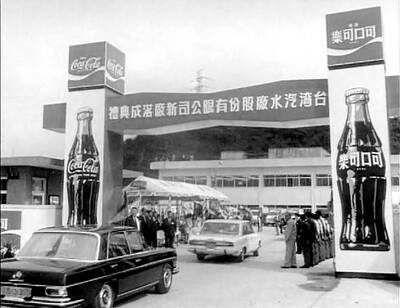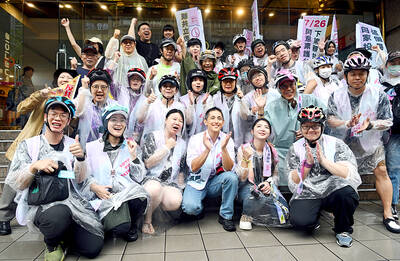Coffee lovers can be notoriously picky about what constitutes a good cup of coffee, whether it be a tiny espresso or a big, frothy latte. To serve this growing crowd of coffee connoisseurs, a vast array of coffee shops have sprung up around Taipei. As a result it has become increasingly difficult to tell the good from the merely indifferent, and the Taipei City Government, following on the success of event such as the Taipei International Beef Noodle Festival (台北牛肉麵節), has initiated the “Coffee and Taipei, Memory and Glory” Taipei Specialty Coffee Festival (咖啡記憶 臺北時光 — 2008臺北精品咖啡嘉年華) this year to celebrate Taipei’s burgeoning coffeehouse culture.
The festival has been created in coordination with the recently established Taipei Specialty Coffee Association (台北精品咖啡商業發展協會) led by Cho Wei-min (卓偉民). One of the main events of the festival was an Internet poll of Taipei’s best coffee shops. This was followed by a review by Cho and other industry judges to select the best 30 coffee shops in Taipei.
Most of the stores are boutique coffee establishments. Selection was primarily based on the quality of the coffee, the professional knowledge of staff, as well as things such as hygiene, service and atmosphere.
“Chains such as Starbucks and Barista [西雅圖咖啡] have done a lot to develop the growth of coffee culture in Taiwan. They have put a lot of energy into educating the public,” Cho said in an interview at the association’s Tasting Room. “Because they are well-funded chain stores, they can set up in busy areas, promoting coffee as something exotic and attractive. They created a foundation for coffee culture in Taiwan.”
Some of the coffee shops selected, such as the recently opened Espressamente Illy in Taipei 101, are relatively large commercial ventures that are notable as much for their up-market decor as their coffee, but many others are small operations run by people who have developed a fascination for coffee. “Running a coffee shop has become a dream for many people in Taipei,” Cho said.
This dream, which sometimes does not take much account of knowledge or experience, is probably why there are so many bad and mediocre coffee shops around. One of the reasons for the competition is to give some exposure to those establishments that manage to stand out from the crowd. “The emphasis in these places is on the coffee itself, not on the marketing,” Cho said.
“In this competition, we wanted to give prominence to those establishments that represent coffeehouse culture ... that provide a place where people can relax and enjoy a cup of something special,” Cho said. He added that professional knowledge about where the coffee beans come from, of different blends and of different preparations was what made people willing to pay a little extra and helped these smaller cafes survive. “With Internet ordering, it is now possible to get high-quality beans from overseas in relatively small amounts,” Cho said. “If you put it out [on the Internet] that you have obtained award-winning beans, you will certainly get coffee connoisseurs coming to your store to get a taste,” Cho said. “There is no need to advertise.”
An increasing number of coffee shops now roast their own beans, further diversifying the options for consumers. “There are probably 200 to 300 establishments in Taipei roasting their own beans,” Cho said. “The advantage is freshness. Roasted beans retain their freshness for a very short time, just a few days. But of course, these small-volume roastings are sometimes less reliable in quality.”
The test ultimately is in drinking the coffee, and this, of course, depends on who’s making it. This afternoon at 1pm, a coffee brewing and tasting festival will be held at Taipei Water Park (台北自來水園區) located at 1 Siyuan St, Taipei City (台北市思源街1號). In addition to the competition, there will be a concert by band Nan Quan Mama (南拳媽媽) from 4:10pm, Southeast Asian music, samba dancing and lectures on fair-trade coffee and coffee culture. There will also be plenty of coffee to drink.
The list of 30 coffeehouses that Cho and his colleagues have come up with is far from comprehensive, and many coffee lovers many find a favorite establishment neglected, but it is certainly as good a starting point as any when in search of a cup of quality java.

July 28 to Aug. 3 Former president Chiang Kai-shek (蔣介石) reportedly maintained a simple diet and preferred to drink warm water — but one indulgence he enjoyed was a banned drink: Coca-Cola. Although a Coca-Cola plant was built in Taiwan in 1957, It was only allowed to sell to the US military and other American agencies. However, Chiang’s aides recall procuring the soft drink at US military exchange stores, and there’s also records of the Presidential Office ordering in bulk from Hong Kong. By the 1960s, it wasn’t difficult for those with means or connections to obtain Coca-Cola from the

No one saw it coming. Everyone — including the Chinese Nationalist Party (KMT) — expected at least some of the recall campaigns against 24 of its lawmakers and Hsinchu Mayor Ann Kao (高虹安) to succeed. Underground gamblers reportedly expected between five and eight lawmakers to lose their jobs. All of this analysis made sense, but contained a fatal flaw. The record of the recall campaigns, the collapse of the KMT-led recalls, and polling data all pointed to enthusiastic high turnout in support of the recall campaigns, and that those against the recalls were unenthusiastic and far less likely to vote. That

Taiwan is today going to participate in a world-first experiment in democracy. Twenty-four Chinese Nationalist Party (KMT) lawmakers will face a recall vote, with the results determining if they keep their jobs. Some recalls look safe for the incumbents, other lawmakers appear heading for a fall and many could go either way. Predictions on the outcome vary widely, which is unsurprising — this is the first time worldwide a mass recall has ever been attempted at the national level. Even meteorologists are unclear what will happen. As this paper reported, the interactions between tropical storms Francisco and Com-May could lead to

A couple of weeks ago the parties aligned with the People’s Republic of China (PRC), the Chinese Nationalist Party (KMT) and the Taiwan People’s Party (TPP), voted in the legislature to eliminate the subsidy that enables Taiwan Power Co (Taipower) to keep up with its burgeoning debt, and instead pay for universal cash handouts worth NT$10,000. The subsidy would have been NT$100 billion, while the cash handout had a budget of NT$235 billion. The bill mandates that the cash payments must be completed by Oct. 31 of this year. The changes were part of the overall NT$545 billion budget approved